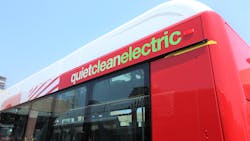San Diego MTS purchases 12 electric buses to service South Bay’s all-electric Iris Rapid Route
The San Diego Metropolitan Transit System (MTS) has purchased 12, 60-foot battery-electric buses to provide service on the new 100 percent electric Iris Rapid Route.
This new route will provide fast, limited-stop service in the South Bay area, from Otay Mesa to Imperial Beach via State Route 905 and Coronado Ave. It is scheduled to open in early 2023.
“The purchase of these buses for the first all-electric Rapid route in our region is a huge leap forward towards a greener future, environmental justice, sustainability and better air quality,” said Nathan Fletcher, MTS Board chair and chair, San Diego County Board of Supervisors. “MTS will also put five new 40-foot electric buses into service over the next few weeks, adding to its existing fleet of eight electric buses. When the Iris Rapid comes on line, MTS will have 25 electric buses in operation."
The transition to an all-electric fleet is part of the MTS Zero-Emissions Bus (ZEB) program. The Iris Rapid represents the next step in MTS’ commitment to transitioning to a fully zero-emission bus fleet by 2040, and helping the San Diego region meet its climate action plan goals. The Iris Rapid is the latest expansion of MTS’ Bus Rapid Transit (BRT) network and will provide a first-of-its-kind all-electric Rapid service to residents in San Diego’s South Bay by linking the Otay Mesa Transit Center to the neighborhoods along the Imperial Beach shores. In between, the Iris Rapid will connect riders with the UC San Diego Blue Line Trolley at the Iris Ave. Transit Center, providing an important link to the employment and education centers in downtown and UTC.
For this latest electric-bus order, MTS selected New Flyer of America Inc., a subsidiary of NFI Group Inc.
“In the past 30 years, NFI has delivered over 600 buses to MTS. It was one of the first transit agencies in the U.S. to move to a compressed natural gas bus fleet, and is a pioneer in sustainable mobility,” said Paul Soubry, president and CEO, NFI. “We are pleased to continue supporting MTS as it drives towards California’s Innovative Clean Transit goal of a 100 percent zero-emission fleet by 2040.”
These electric buses are equipped with advanced modular battery packaging, long-range batteries and a lightweight traction drive system, delivering smooth, quiet and emission-free transportation to San Diego County.
This purchase is the latest in a series of moves the agency has made toward a stronger commitment to clean air:
- In December 2019, MTS began its ZEB pilot by testing six battery-electric buses and setting in motion the two-year electric bus pilot program. The buses' range was tested under various driving characteristics, including weather, topography and more.
- In September 2020, the MTS Board approved a transition plan to convert all of the agency’s 750 buses to zero-emission by 2040.
- MTS committed to purchasing its last gas-powered bus in 2028.
- Transition will cut the agency’s greenhouse gas emissions on the bus side by approximately 43 percent over the next 19 years.
- In February 2021, MTS retired the last diesel bus in its fleet.
- MTS is currently planning to build a new LEED-certified bus division for electric buses. The new bus division will be designed from the ground-up to primarily park, charge, and service zero-emission buses.
- MTS is in the process of retrofitting its South Bay bus division with ZEB charging infrastructure to support electric buses.
